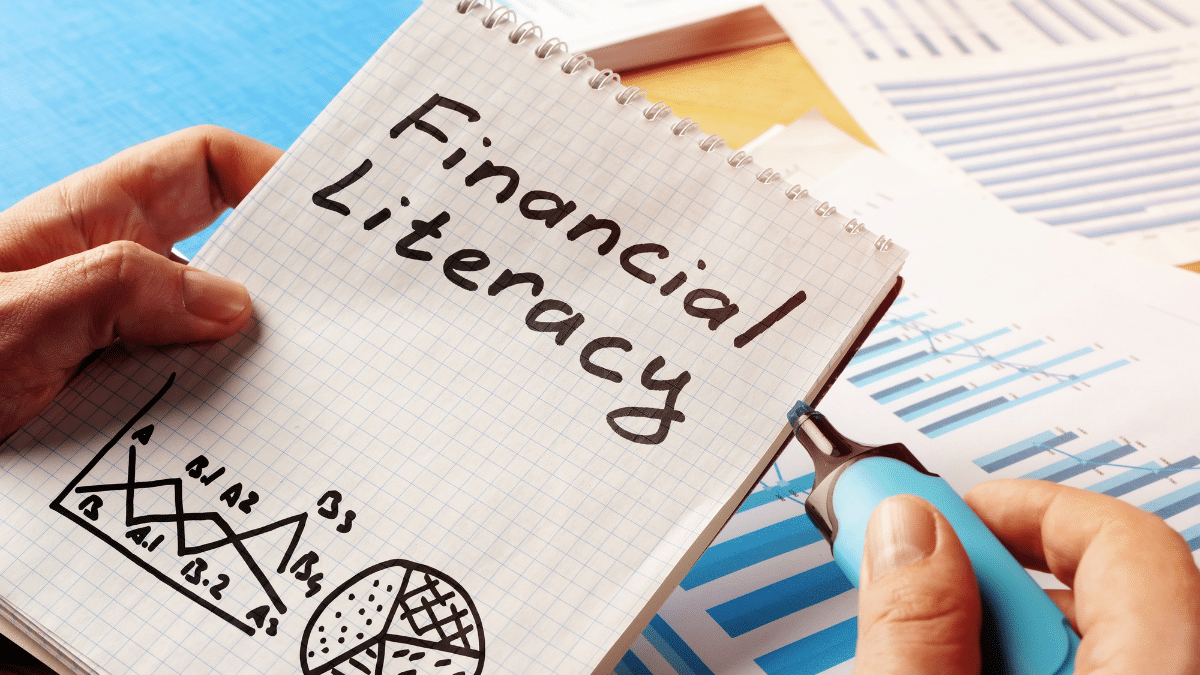Beginner’s Guide to Financial Literacy in South Africa (Free Course Inside)

Have you ever seen your bank balance and thought, “Where did all my money go?”
You’re not alone.
It is no secret that money can be a real deal and sometimes be stressful.
If nobody ever taught you how to deal with it.
That’s where financial literacy becomes such a vital factor.
You might be living off your paycheck, saving for a nest egg, or looking to invest in your future. Whatever the case, learning how to allow money to work for you is the key to a more prosperous existence.
In this blog, we’re exploring the value of financial literacy in South Africa and telling you how you can get access to a free course that’s empowering thousands to own their money—one smart choice at a time.
Let’s break it all down.
Why Financial Literacy Matters More Than Ever?
We live in a world where buying is easy and saving is hard.
Swipe your card, click “Buy Now,” and poof—money disappears.
But when you understand how money works, you get to decide how to use it.
And that’s what financial literacy is all about.
It’s not about being rich.
It’s about being smart.
When you’re financially literate, you can:
- Avoid debt traps
- Save for emergencies
- Plan for retirement
- Invest with confidence
- Say “yes” to opportunities without financial panic
In South Africa, where income inequality and debt are real challenges, building financial literacy can change lives—generationally.
But here’s the best part.
You don’t need a degree to get started.
The Rise of Free Financial Education in South Africa
The good news?
There’s a movement happening.
Across South Africa, free money management courses and community programs are popping up to bridge the financial education gap.
One course that stands out is the “Smart Money SA” initiative—a practical, no-fluff online course that’s completely free and built specifically for South Africans.
It’s not just theory.
You’ll learn real-life strategies to manage income, reduce expenses, and plan for the future.
You’ll even get a grip on investment basics and how to avoid common money mistakes.
All you need is internet access, an email address, and a willingness to learn.
What Aspects Will You Gain in a Dedicated Financial Literacy Course?

Let’s get into the juicy stuff.
Here’s what most quality courses cover—especially those focused on financial literacy in South Africa:
-
Budgeting Like a Boss
- How to track every rand
- Understanding wants vs. needs
- Creating a monthly spending plan
- Tools and apps to stay on track
Budgeting is your roadmap. Without one, you’re just winging it.
-
Saving and Emergency Funds
- Why saving isn’t just for rich people
- Building an emergency cushion (even if you earn a minimum wage)
- Setting short-term vs. long-term goals
This is how you stop living paycheck to paycheck.
-
Crushing Debt
- Understanding good debt vs. bad debt
- Strategies to pay off loans and credit cards faster
- Why the interest rate matters
Debt doesn’t have to control you. You can flip the script.
-
Investment Basics
- Stocks, bonds, and real estate—explained simply
- How to start investing with little money
- The power of compound interest
Even small investments can turn into big returns over time.
-
Financial Planning Education
- Planning for big life moments (like buying a home or having a baby)
- Retirement planning in the South African context
- Setting goals that align with your values
It’s not just about money. It’s about creating the life you want.
The South African Perspective
You might be wondering—why focus on financial literacy in South Africa for a U.S.-based audience?
Well, here’s the matter of the fact!
Financial literacy isn’t a “nice-to-have.” It’s a must-have—no matter where you live.
But in South Africa, the stakes are even higher.
- Around 75% of South Africans spend more than they earn.
- Over 10 million are in debt review.
- Only a small percentage have access to professional financial advisors.
For many, the only way to get financial guidance is through free online courses and community-driven resources.
That’s why these programs matter.
They empower people to build better futures—even when the odds feel stacked against them.
And for those watching from abroad, it’s an inspiring model for grassroots education that truly transforms lives.
You may also like: How Top South African Entrepreneurs Manage Their Business Finances?
How to Access the Free Course?

Ready to take the leap?
Here’s how to get started:
- Find a reliable provider: Look for programs supported by local banks, NGOs, or education platforms. “Smart Money SA,” “FinLit Africa,” and “SAYouth Mobi” are good starting points.
- Register for free: Most platforms require basic information—name, email, phone number.
- Work at your own pace: The best part? These courses are online and self-paced. You don’t need to finish in one sitting.
- Get certified: Some courses even offer a certificate of completion you can add to your resume or LinkedIn.
There are no catches. Just the chance to level up your life.
What Makes These Courses So Effective?
Let’s be real—some online courses are boring.
But the ones making waves in South Africa are different.
They’re:
- Short and practical
- Culturally relevant
- Easy to understand
- Designed for mobile phones
- Focused on real problems, not theory
Whether you’re a teenager learning about your first paycheck or a parent juggling bills and groceries, these lessons meet you where you are.
And that’s what makes them powerful.
Real Stories from Real South Africans
Let’s hear from a few people who’ve taken the course:
* Thabo, 24 (Johannesburg)
“I used to spend everything I earned on clothes and nights out. After the course, I started saving 10% of my salary. Two years later, I have R25,000 saved and I’m looking into investing. It changed my mindset completely.”
Lerato, 38 (Cape Town)
“We didn’t grow up talking about money. I wanted to break that cycle for my kids. The course helped me start a budget, open a savings account, and plan for their education.”
Nomsa, 50 (Durban)
“Even at my age, I didn’t know about interest rates or loan terms. I finally feel confident reading financial documents. That’s priceless.”
These stories show it’s never too early—or too late—to get smart about money.
The Global Impact of Financial Education
Here’s something powerful:
When people become financially literate, communities become stronger.
- There’s less dependency on loans.
- Children grow up learning better habits.
- Small businesses get a better shot at survival.
- Generational wealth becomes a real possibility.
So even if you’re reading this from the U.S., know this:
Supporting or learning from programs like financial literacy in South Africa isn’t just charity or curiosity—it’s a smart move for global financial empowerment.
How to Support or Get Involved?
Want to help spread financial knowledge?
Here are a few ways:
- Share this post with friends or family in South Africa.
- Partner with nonprofits working on financial education programs.
- Offer your skills as a volunteer or mentor.
- Donate to initiatives like SmartStart, Harambee, or FinLit Africa.
- Learn from these programs and implement similar efforts in your community.
Financial literacy isn’t just a South African issue—it’s a global one.
Final Thoughts: Your Journey Starts Now
Look, you don’t have to become a finance guru overnight.
Start small.
Take a course. Read a blog. Track your spending for a week.
Because when you know how to manage your money, you get freedom.
Freedom to plan. Freedom to breathe. Freedom to live life on your own terms.
And that? That’s the real power of financial literacy.
FAQs About Financial Literacy Courses in South Africa
-
Are financial literacy courses in South Africa really free?
Yes! Several courses are 100% free and sponsored by local banks, non-profit organizations, or government programs. It’s your responsibility to know you’re enrolling via a valid platform.
-
Am I allowed to enroll in these courses if I am not living in South Africa?
Yes. The majority of the courses are web-based and available to all.
They’re especially useful if you have family or business connections in South Africa or would like to pick up some good tips about money.
-
What age group are these courses geared towards?
Yes! Students, young career professionals, or retirees, everyone needs financial literacy. The material is typically beginner-level and simple.
-
Do the courses cover things such as saving and investing?
Yes. You’ll gain investment fundamentals, how to save money, how to create a budget, and how to handle debt. Some higher-level courses also touch on retirement and financial planning coursework.
-
Will I receive a certificate when I complete the course?
A certificate of completion from certain courses can be utilized for professional as well as personal growth. Take a look at the course information before enrolling.





